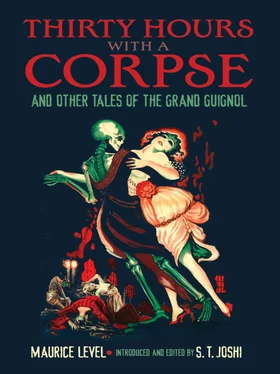I was about to go on with my explanation, but at this moment the locomotive shrilled piercingly and a formidable uproar started. I spoke loudly, for the tumult increased and covered my voice: “We are entering the tunnel. I shall resume when we’re out of it—can’t hear anything now—”
The old gentleman sank back on the seat. The young woman kept her eyes on the photograph. The husband leaned against the side of the car, and I saw his lips move, guessed the words: “It’s stuffy.”
And he leaned out of the window, as if to place his face in the rush of air. It seemed to me then that I heard an odd sound, something like a muffled cry or a moan, with another, slighter, indescribable noise, a crunching, squishing sound. My companions must have heard it also, through that thunderous din, for all three lifted their heads questioningly. Then, as it was not repeated, we looked at the print again. For a minute, the train crashed on in the tunnel, then the sounds lessened, the air felt lighter, and the steam which had whirled into our compartment through the open window drifted and dissolved. We were rolling under the open sky again.
But as I was about to resume my explanation, I suddenly noticed that the young man, braced in his corner near the window, one arm hanging outside, had grown dreadfully pale. He swept us, his wife, with an insane stare.
“You feel faint, Monsieur?” I risked.
He lurched, and I scarcely had time to catch him as he fell face forward. It was then that I noticied at the end of his right arm something bloody, broken, shapeless, a mass of flesh and smashed bones dripping blood.
“Oh! The poor fellow!” the old gentleman cried out. “He slipped and struck the wall of the tunnel. His hand’s gone!”
The young wife rose.
Already, ripping the sleeve of the wounded man, I was applying a tourniquet improvised with my handkerchief to stop the spurting blood. He opened his eyes, his bewildered eyes, and his glance swept down his arm to his horrible wound. Then he looked wildly at the motionless girl. She dropped back on the seat, and with chattering teeth she clutched him against her breast without speaking a word.
Suddenly, the old man’s sentence echoed in my ears: His hand is gone. And I looked down at the photograph fallen to the floor of the car. The wounded man followed my eyes with his own. And I remembered that I had said: he will be discovered unless he strikes off his hand at the wrist.
The suspicion, then the certainty, entered my consciousness almost together. But before those pleading eyes in the tortured face, I had neither the will, nor perhaps the wish, to speak. And we waited for daylight without exchanging another word.
As it was still dark when the train reached Vallorbe, the wounded man was not taken off the train until we arrived at Lausanne. I never heard of him again.
But I know that the murderer of Pergolese Street was never found.
Thirty Hours with a Corpse
DAY HAD come at last. The two men looked at each other and although they did not move or speak, each read in the eyes of his companion relief—followed quickly by fear. With the growing light a murmur of voices came up from the newly awakened street. They waited tensely almost as if they expected some unknown accuser to burst open the door, rush in, and seize them.
An interruption such as that, or death, even, at the hands of an infuriated mob would have been welcome, anything that would somehow, some way, break the continuity of horror that had held them for hours speechless and motionless beside the dead body of a woman lying face downward on the floor.
But life was resuming its activities casually enough in the streets, sounds of opening shutters, the shrill cry of a vegetable vendor. It was this last sound that seemed to arouse the younger of the two men, Armand Barthe. Barthe’s eyes held a staring fixity of expression, but his lips trembled now. He hesitated for a moment, looked toward the window, then with a quick, convulsive movement picked up his overcoat and put on his hat.
“Where are you going?” Guiret asked sharply, before he had reached the door.
“Out—out—come with me—”
“You must be crazy. It won’t be long before the concierge will be up to do our rooms. He would find it and the police would be on our tracks before we could get out of Paris—”
“But—but we are lost, we are lost—”
“No!” Guiret denied vigorously, even though he could not, at the moment, see any way to escape the consequences of the crime.
Barthe usually deferred to his roommate on important questions. He appeared to gain a momentary composure, to feel almost reassured. He did not speak because he felt that Guiret had not yet made definite plans. Guiret was thinking, he knew that, and while he waited to hear the results of that thinking, he put his palms over his eyes, pressing them on the eyeballs, but even then he seemed to see the body.
“Armand—” Guiret said, so abruptly that Barthe started violently, as if awakened from sleep.
“What is it?”
“Get your big trunk—it’s empty, isn’t it?”
“Yes—” Barthe replied, but made no move to go.
Guiret got up impatiently, went into Barthe’s bedroom, and came out dragging the high, round-topped trunk after him. The sweat was running from his temples, for the trunk was heavy even though it was empty. He took out his handkerchief and wiped his forehead, then unfastened the straps and lifted the cover.
“Yes, it will do,” he said. “Help me—”
“Help you?” Barthe questioned stupidly.
“Yes, yes!” Guiret cried out, suddenly tense, unnerved for a moment through the contagion of his friend’s terror.
“I—I can’t—”
“But we must!” Guiret insisted. “We must cram it inside some way. It’s our only chance. There is a train for Switzerland in two hours, another one later if we miss that. We’ll buy three tickets, two for us to Lausanne, the third to check the trunk somewhere else. We’ll be far away when the customs inspector tries to open it. We’ll cross Germany, go as far as Hamburg. There we will get a boat for somewhere.”
“But if we are suspected?”
“Why should we—two tourists—who would bother us? Come on, now—you take the head.”
For a few moments there was no sound in the room save their labored breathing.
“Wait—wait!” Barthe cried out nervously.
“What’s the matter now?”
“The head has fallen back—”
“Hold it up, then. Now—now press down. There, you see, it was quite simple—”
Barthe drew his hands back from the head that he had supported almost tenderly, a strange gentleness that grew out of his horrified remorse. He stepped back and, when he heard the snapping of the lock into place, he grasped the table for support. Guiret buckled the straps, then straightened up briskly.
“Call the concierge,” he said. Then he noticed that Barthe held his hat in his hand, his overcoat over his arm. “Never mind,” he said hastily, “I’ll tell him.” He opened the door, stepped into the hall, and called down the stairs: “Monsieur Legros—Monsieur Legros!”
The loud voice of the concierge responded: “What is it?”
“Will you give us a hand to take down a trunk?”
“I’ll be right up.”
Guiret came back into the room, closed the door, and hurriedly took his wallet from his coat pocket. “Take some money,” he said: “One never can tell. We might get separated.”
Barthe accepted the notes without counting them and put them in his pocket mechanically.
The heavy step of the concierge was heard on the stairs and Guiret swung the door wide.
“Good morning, Messieurs,” Legros said, under his habitual cordiality a note of surprise and disapproval: “Are you leaving?”
Читать дальше












